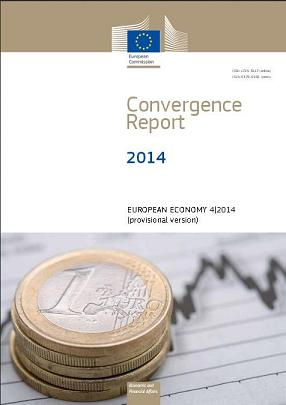European Commission (2014) “Convergence Report, European Economy 4/2014”, Economic and Financial Affairs, Ιούνιος: Βρυξέλλες. Convergence Reports examine whether Member States satisfy the conditions for adopting the single currency. Convergence reports are issued by the European Commission and the European Central Bank every two years, or more often if a country intending to join the euro requests it. These reports form the basis for the decision on whether a Member …Read More
The euro’s effect on trade
Sadeh, T. (2014) “The euro’s effect on trade“, European Union Politics, Vol. 15, No. 2, Ιούνιος. This study argues that the euro area more than doubled trade among its members, but this process was delayed and fitful. The estimates in this article are close to those obtained by Rose and Frankel, despite the usage of methods developed by their critics. Furthermore, the euro area has increased the trade of …Read More
Lacklustre investment in the Eurozone: Is there a puzzle?
Buti, M., Mohl, Ph., (2014), “Lacklustre investment in the Eurozone: Is there a puzzle?”, www.voxeu.org, 4 Ιουνίου. Investment in the Eurozone is forecast to remain below trend until 2015, with a particularly large shortfall in the periphery. Low investment reduces aggregate demand, thus lowering short-term growth, and it also hampers medium-term growth through its effect on the capital stock. This article highlights three causes of low Eurozone investment – reduced …Read More
Voting With Their Feet’, Highly Skilled Emigrants From Southern Europe
Gropas, R. & Triandafyllidou, Α. (2014) “’Voting With Their Feet’, Highly Skilled Emigrants From Southern Europe”, American Behavioral Science (ABS), Ιούνιος. In this article, the authors present new empirical data on highly skilled emigrants from two southern European countries, Italy and Greece, which have been particularly hit by the global financial and Eurozone crisis. The data have been generated by an e-survey conducted in late spring and summer 2013. …Read More
Is Piketty’s ‘Second Law of Capitalism’ fundamental?
Krusell, P. & Smith, T. (2014) “Is Piketty’s ‘Second Law of Capitalism’ fundamental?“, VoxEU Organisation, 01 Ιουνίου. Thomas Piketty’s new book has been widely praised for its empirical contribution, but his prediction of rising inequality rests on economic theory. This column argues that Piketty’s pessimistic forecast is based on an extreme – and unrealistic – assumption about households’ saving behaviour. According to standard theory, the wealth–income ratio would increase …Read More
Exchange-rate flexibility and credit during capital inflow deversals: Purgatory… not paradise
Magud, N. & Vesperoni, R. E. (2014) Exchange-rate flexibility and credit during capital inflow deversals: Purgatory… not paradise, VoxEU Organisation, 30 Μαΐου. Expansionary monetary policy in advanced economies have created capital inflow booms in emerging markets. This column analyses the effect of exchange rate flexibility on credit markets during capital inflow booms. In economies with less flexible exchange rate regimes, credit grows faster and more towards foreign currency. These …Read More
Determinants of the growth and sovereign debt correlation
Lof, Μ. & Malinen, Τ. (2014) “Determinants of the growth and sovereign debt correlation“, VoxEU Organisation, 25 Μαΐου. Public debt and economic growth are historically negatively correlated. This column discusses new evidence that rejects the debt-to-growth causality. After estimating the effects between debt and growth in both directions, there is no evidence that high indebtedness suppresses economic growth. The effect of growth on debt is the main driver of …Read More
Spillovers from systemic bank defaults
Mink, M. & de Haan, J. (2014) “Spillovers from systemic bank defaults“, VoxEU Organisation, 24 Μαΐου. To date, much uncertainty exists about how large the spillovers would be from the default of a systemically important bank. This column shows evidence that the market values of US and EU banks hardly respond to changes in the default risk of banks that the Financial Stability Board considers globally systemically important (G-SIBs). …Read More
Disappearing government bond spreads in the eurozone – Back to normal?
De Grauwe, P. & Ji, Y. (2014) “Disappearing government bond spreads in the eurozone – Back to normal?“, Economic Policy, CEPS Working Documents, 14 Μαΐου. Since the announcement of the Outright Monetary Transactions (OMT) programme by Mario Draghi, President of the ECB, in 2012, the government bond spreads began a strong decline. This paper finds that most of this decline is due to the positive market sentiments that the …Read More
Why The Recovery Needs Wage Growth
Ozlem Onaran, Ο. & Stockhammer, Ε. (2014) “Why The Recovery Needs Wage Growth“, Social Europe Journal, 21 Μαΐου. Five years after the beginning of the recession real wages in Britain are still well below their pre-crisis level. As of March 2014 real weekly earnings (deflated by the RPI) are at the level of November 2000; that is a staggering 12% below their peak in February 2008. Is that a …Read More





